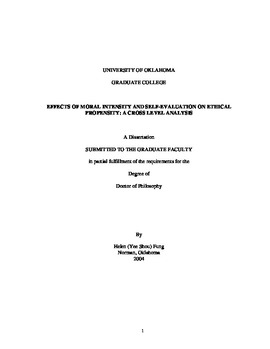| dc.contributor.advisor | Buckley, Michael R., | en_US |
| dc.contributor.advisor | Mendoza, Jorge, | en_US |
| dc.contributor.author | Fung, Helen (yee Shou). | en_US |
| dc.date.accessioned | 2013-08-16T12:19:27Z | |
| dc.date.available | 2013-08-16T12:19:27Z | |
| dc.date.issued | 2004 | en_US |
| dc.identifier.uri | https://hdl.handle.net/11244/759 | |
| dc.description.abstract | An empirical study examined the relationships between Jone's (1991) moral intensity and self-evaluation bias with ethical propensity. Results suggested that individuals with a self-enhanced tendency in their own ethical evaluation tended to engage in unethical decision-making across different levels of outcome concentration and magnitude. Additional findings also suggested that individuals' overestimation of their own ethical propensity, as well as their self-reported likelihood to engage in an unethical decision, decreased as the effectiveness of the accountability system increased. Implications of self-enhancement tendency in one's own ethical perception and ethical decision-making would be discussed. | en_US |
| dc.format.extent | v, 89 leaves : | en_US |
| dc.subject | Decision making Moral and ethical aspects. | en_US |
| dc.subject | Psychology, Industrial. | en_US |
| dc.subject | Business Administration, Management. | en_US |
| dc.title | Effects of moral intensity and self-evaluation on ethical propensity: A cross-level analysis. | en_US |
| dc.type | Thesis | en_US |
| dc.thesis.degree | Ph.D. | en_US |
| dc.thesis.degreeDiscipline | Department of Psychology | en_US |
| dc.note | Advisers: Michael R. Buckley; Jorge Mendoza. | en_US |
| dc.note | Source: Dissertation Abstracts International, Volume: 65-07, Section: B, page: 3756. | en_US |
| ou.identifier | (UMI)AAI3138518 | en_US |
| ou.group | College of Arts and Sciences::Department of Psychology | |
